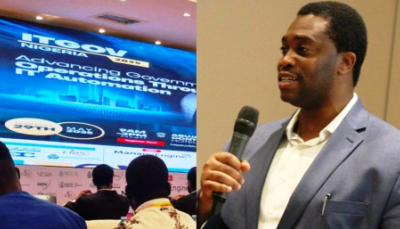Principal Consultant to Lonadek Nigeria Limited Dr. Ibilola Amao talks to IT Edge News, Anthony Nwosu, on how Lonadek has impacted on the energy and ICT sectors why company is investing in altering for good, Nigeria’s human capacity output.
What has Lonadek brought to the marketplace?
Lonadek appreciates the ICT challenge in Nigeria and we are strategically positioned to tackle it headlong in order to produce a virile nation with ICT as the core driver of our economy through capacity, capability and competence development. Beyond ICT, we are focused on value creating ICT related services in engineering and enterprise, most specifically, energy, power, oil, gas, infrastructure, manufacturing, etc. Lonadek Nigeria Limited is an International Computer Drivers License (ICDL) accredited learning and test centre. The ICDL is an international certification in ICT skills development with a global outreach in well over 140 countries. Plseae go to: www.icdlafrica.org. The company is in strategic partnership with companies like AVEVA and Bentley to deliver world class cutting edge engineering software solutions such as PDMS, E3D, SACS, Staad PRO, AutoPIPE, etc. Lonadek software and support services are provided to major multinational and indigenous oil and gas companies for plants, offshore structure designs, modifications, analyses and lots more. At the heart of these solutions is a high level of optimization, cost effectiveness, globally acceptable output and seamless collaborations across project teams.Bentley delivers state-of-the-art software solutions for the entire life cycle of an infrastructure asset, tailored to the needs of engineers, architects, planners, contractors, fabricators, IT Managers, operators in architecture and construction and engineering, procurement construction in power, energy, hydrocarbon and infrastructure sectors. Around the world, engineers and architects, constructors and owner operators are using Bentley software solutions to accelerate cost-effective project delivery, facilitate collaborative execution of project and seamless integration with existing projects. With constant merger and acquisitions, Bentley boasts of numerous cutting edge software applications applicable to all design and engineering operations in different industries. Fromthe conceptual stage of a project till the execution stage, you will find Bentley software solutions very useful and highly critical. The uniqueness of Bentley solutions is the ability and enabling platform to do more across project locations without any form of barrier. See: www.bentley.com . Lonadek also has a unique training offering known as Document Controls and Management with an international accreditation by the Institute of Leadership and Management (ILM), United Kingdom. A document controls and management process promotes paperless, electronically driven document management and eradicates bureaucratic physical document transactions. You will agree with me that if it takes time of productive man hours to ransack loads of scattered documents and locate a document of interest, then it makes economic sense to have a system in place to access the same file in minutes. Information and asset management is another landmark from Lonadek. We are aligned with Boxley Group in Information and Asset Management. Boxley Group is an American based company that enhances information and asset management with global best practices hinged on programmatic, pragmatic and practical approach to project delivery that is sustainable. Boxley Group is a major player in energy, power ,hydrocarbon, utility and manufacturing industries. Information and assets management is a multifaceted solution for various industries with vested interests in large information hub consisting of data, drawings, documents, records and lots more together with capital infrastructure. See: www.boxleygroup.com. The need to have a central point of management and administration of the capital assets/infrastructure with their associated records, information and documentations cannot be overemphasized. In today’s business world that is majorly driven by data and information, a secure and accessible portal with fool proof redundancy and points of failure is a must-have. The multibillion dollar oil and gas industry takes very seriously her operational information and have zero tolerance for redundancies when the information needs to be accessed. Lonadek balances that side of the aisle with VNET solution from our technical partner: AVEVA. We are always at the forefront of process automation using ICT. Change Management is a value adding package that springs forth from Asset and Information Management. Change Management leverages on ICT adoption as a people and process enabler in an organization to enhance productivity and increase profitability. Let me cite a simple analogy with a typical file sharing and document exchange /revision and approval process in an organisation. The conventional file sharing system in a Microsoft windows environment could be a bit clumsy with so much latency owing to permissions and security. Imagine how many man-hours would be invested into sharing operational critical file and folder on all the computer systems in an organization. Another notable operational deficiency is when managers have to sweat it out during the process of document revisions and approval. Mostly, it is usually an endless cycle of document exchange via emails characterized with improper document numbering. Document controls and management involves intelligent file naming, file numbering with each revision tracked until the final approval stage when the file can be downloaded. Naturally, human beings have the tendency to oppose change in their preferred and proffered ways of doing things. Change Management recognizes that peculiarity and uses psychological and behavioral indoctrination to promote and encourage technology adoption in a company. Lonadek is at the forefront of change management in partnership with the Boxley Group.
What is Lonadek doing in the area of local content in IT development?
It is no longer news that Nigeria ranks poorly in the global ICT rating. According to the World Economic Forum’s Global Information Technology Report of 2015, Nigeria’s ranking in Information and Communication Technology (ICT) development dropped to the 119th position Network Readiness Index is a crucial indicator of a country’s ability to implement and take full advantage of ICT.As it were, Nigeria is still behind the rest of the world as far as ICT adoption and innovation are concerned. Lonadek in the quest to domicile ICT skills locally has partnered world class organizations such as International Computers Drivers License (ICDL) Africa. At Lonadek, we have a local content capacity building strategy that targets the students at various levels of learning and young professionals. The essence of this bottom-up approach is to empower the active labor entrants and labor force that would build up on the acquired skills and replicate them across board. We have successfully trained individual, students, professionals, government agencies in basic and advance ICT skills. We are working closely with educational institutions, Non-Governmental Organizations (NGOs), government agencies and relevant stakeholders to promote ICT skills with the avowed commitment to increase the level of participation in ICT growth and development in Nigeria by Nigerians. As a firm of technical consultants with core competencies in engineering and ICT solutions and support services, Information and Asset Management and ICT focused training, we have domesticated globally sought after engineering skills needed by multinational and indigenous companies to execute their various design projects, manage their assets and run their operations. To date, we have churned out PDMS, SACS, Autodesk and ICDL certified competent administrators, designers and users in large number. As against what was the norm when you have expatriates undertaking the design operations, Nigerians now have the skills, garnered competency and are even mentoring their subordinates. With all sense of modesty, Lonadek is contributing a great deal to the development of local capacity and competence in ICT across various sectors. If you take a sneak peek around the oil and gas industries, financial services companies, aviation, maritime, public and tertiary institutions, you will see the evidence of our past trainees in document controls and management who are using ICT and global best practices to turn around the fortunes of their organisations.
Dearth of requisite ICT skill has bedeviled the Nigerian ICT sector, how are you bridging this gap with vendor development and entrepreneurship?
There are different perspectives to categorize ICT skills acquisition. You can view it from the angle of ICT skills in basic and domestic utilization, professional and corporate advancement and engineering/complex applications. Our vendor development and entrepreneurship matrix is all-encompassing. From the beginning of this interview, I have been emphasizing ICT as potent tool for process automation and optimization. If we must hold the bull by the horn, then we must dig deep into Science Technology Engineering and Mathematics (STEM) education. How have the government and other stakeholders fared in STEM education. Globally, STEM education is increasingly gaining attention. Even the United States of America is vigorously pursuing STEM in her attempt to continue to dominate the world’s economy. If the basic ingredients of STEM are lacking in an individual, his ICT skills development would be porous. We have embarked on a laudable project called the STEM Hub Initiative. The whole idea behind its conception is to assemble productive, innovative and sustainable ideas and promote it widely using ICT tools and technology. We are developing partnerships with Original Equipment Manufacturers (OEMs), global institutions and accredited bodies to showcase the unique efforts of Nigerians with an aim to develop ICT professionals, locally. The Nigerian economy will greatly improve when we begin to adopt ICT solutions /technology /tools by Nigerians. We are providing the enabling environment for people with innovative solutions in ICT to grow as vendors and entrepreneurs. We have been working to engage government in the training of Nigerians right from the secondary schools to the tertiary institutions in ICDL, information and library management, social media marketing and to brace them up for the challenges ahead and equip them at the early stage. We believe the youths are definitely going to drive the economy of the nation in the future as budding entrepreneurs, policy makers and independent business owners.
How can Nigerian position herself as an ICT exporter considering the fact that we lack the enabling environment to get these things in place?
The government must carve out medium to long term policies that have the capacities to transform the ICT sector in the areas of local content utilization, ICT competency development or what you may term as ICT education at all levels and massive investment in ICT infrastructure. The quantum of energy channeled to the oil and gas sector should equally be channeled to the ICT sector. Without mincing words, government must take the lead and put in place a level field platform for all stakeholders to competitively and productively engage in ICT capacity development and ICT utilization. Our foreign policies must be reviewed with reference to bilateral and multilateral trade agreements in ICT. What is our relationship with Norway, Singapore, Portugal and our East African neighbor, Kenya just to mention a few? Nigeria needs to understudy the working ICT model and templates in these countries and implement similar strategies locally. What is the government posture towards ICT education? Do we get to see things in the media without tangible impact on the citizens? The agencies that are set up to drive and promote ICT policies and regulations must be empowered by an act of parliament to enforce government policies and promote local content in ICT development and utilization. Government must set the pace in process automation with our home grown solutions such as Remita, Pagapay, Panda, Cash Madam, etc. You begin to wonder about Nigerian manufactured and branded computers. You hardly see them in the stores. Our policies should promote the use of indigenous products by Nigerians. It would be very helpful if government can float installment payment programme with financial institutions to make available computers in every home with standard warranty. The bucks stop at the table of National Information technology Development Agency (NITDA).Given the dynamics of this issue, governments must give priority to ICT education, put in place local content ICT development and utilization programme, empower individuals and SMEs as ICT entrepreneurs and embrace ICT as the core driver of the nation’s economy. From this simple logic, innovations, job creation and revenue generations are the end products to position Nigeria as an ICT exporter. Generally, Nigeria should encourage local content utilization, and development of competence and capacity of ICT practitioners.
What impact have you made in other African countries especially ECOWAS region?
We have provided technical training and local manpower development services to other African countries such as Angola, Cameroun, Ghana, Liberia and the Gulf of Guinea. Majorly, we never bided for those jobs but referrals were made by those we have worked with and who found us worthy to deliver in line with global best practices.
Do you think that Nigerian government and agencies are doing enough in the area of IT security and if not, what measures can they put in place?
Organizations and individuals who utilize ICT solutions are the worst hit from the activities of hackers who put the integrity of such solutions to test. Cases involving unscrupulous transactions in our financial institutions stemming directly from hackers still haunt us. The government must set up national Public Key Identifier (PKI) mechanism that will provide authentication, authorization, confidentiality/privacy and data integrity for electronic transactions by Nigerians in Nigeria and beyond. That is the technology widely used in advanced countries to combat cybercrime. The government needs to set up an ICT Emergency Response team as unit of NITDA with the mandate of building security walls around public and private institutions to remediate and forestall IT security issues.
Running an ICT venture in Nigeria is one uphill task, what are the various challenges you face in Nigeria?
Piracy is an issue. People buy and sell pirated copies of software and that has a lot of negative effect on revenue generation of resellers like us. Also, the cost of running ICT business in Nigeria is on the increase due to the near collapse of our power infrastructure. Low patronage by government and Nigerians because of the preference for foreign solutions and products is another issue. The government is not stimulating projects that require ICT skills and solutions and encouraging local content utilization in ICT sector.
Asset, Information & Change Management is one area that you have made your mark, can we know various firms you have worked with? We have worked with the IOCs including Chevron, TOTAL E&P, Shell, ExxonMobil, and Addax Petroleum. Other companies we have worked with include the engineering, procurement and construction companies, vendors in the oil and gas industry etc.
What are the areas that Nigeria is lacking in ICT and how can ICT be made accessible to the hinterlands?
We are not anywhere close to the rest of the world in ICT education, adoption and promotion. Broadband services continue to overwhelm the customers with bills and sub-optimal services. Voice Communication services is fraught with incessant call drops and poor reception. Satellite technology leaves us at the mercy of foreigners due to underutilization of local facilities. We are yet to switch to Digital Broadcasting by our national carrier when the rest of the world has migrated. Nigeria has not been able to optimize the use of the international submarines cables landing at our shores as there are inadequate fibre optic cables to carry the connections to remote areas and other parts of the country. The service providers are battling with Right of Way to install cable. The Nigerian Communications Commission (NCC) needs to act more efficiently as a regulator. Consumer Protection Agency should appraise services provided by ICT service providers in telecommunication. Data and ICT provision in the area of voice communication, broadband services to the remote areas should be anchored on a private public partnership. A lot of capital is involved to lay fiber optic cables from a base station in Lagos to the remote part of the Northern Nigeria which the government alone cannot shoulder. For the appropriate time when it makes good business and economic development sense, government at all levels must collaborate with competent service providers to install ICT equipment in the hinterlands that will stand the test of time. The fund recovery plan is a thing that would be worked out among stakeholders but that is the only way to ensure standard project execution and better service delivery.
What are your projections for 2016 in the ICT sector and for your firm?
Forecasting tomorrow’s weather is much more difficult than telling what the weather was like yesterday. ICT has not had a fair share of government’s attention and participation in the past. The previous administration came up with some laudable projects such as the National Broadband Plan, E-Government initiative and Government Services Portal which we believe will be sustained by the present administration. Now that the new government is setting the wheels in motion with the appointment of a minister of communication who will oversee ICT, we hope to expect massive growth and development in the ICT industry in the coming days. We don’t want to preempt the ICT agenda of this government but we firmly believe it is the dawn of a new era in ICT development in 2016.Lonadek would position herself strategically to promote ICT education across various levels of our educational institutions, engage the government in ICT empowerment and collaborate with world class ICT companies and service providers to further improve the ICT competency of Nigerians to deliver automated services in energy, power, oil, gas, infrastructure industries. Lonadek would collaborate with government institutions, donor agencies, non-governmental organizations using process automation as the underpinning factor focused on ICT skills and capacities building. We would take ICDL to the majority through public private partnership with Bank of Industries (BOI), National Power Institute of Nigeria (NAPTIN), UNESCO, DFID, NITDA, World Bank, NCDMB, PTDF and relevant stakeholders. The world class Computer Aided Design solutions is another gold mine that Lonadek will open up to tertiary institutions to upskill, technical and vocational competence. We will help companies in energy power and hydrocarbon to develop capacity, capability and competence in the workforce to significantly improve productivity and enhance in-country capacity building. With ICT, we would stem capital and human capital drifts through our massive induction, continuing professional development and provision of globally sought after ICTs.
“We have embarked on a laudable project called the STEM Hub Initiative. The whole idea behind its conception is to assemble productive, innovative and sustainable ideas and promote it widely using ICT tools and technology.”
“The Nigerian Communications Commission (NCC) needs to act more efficiently as a regulator. Consumer Protection Agency should appraise services provided by ICT service providers in telecommunication.”






























